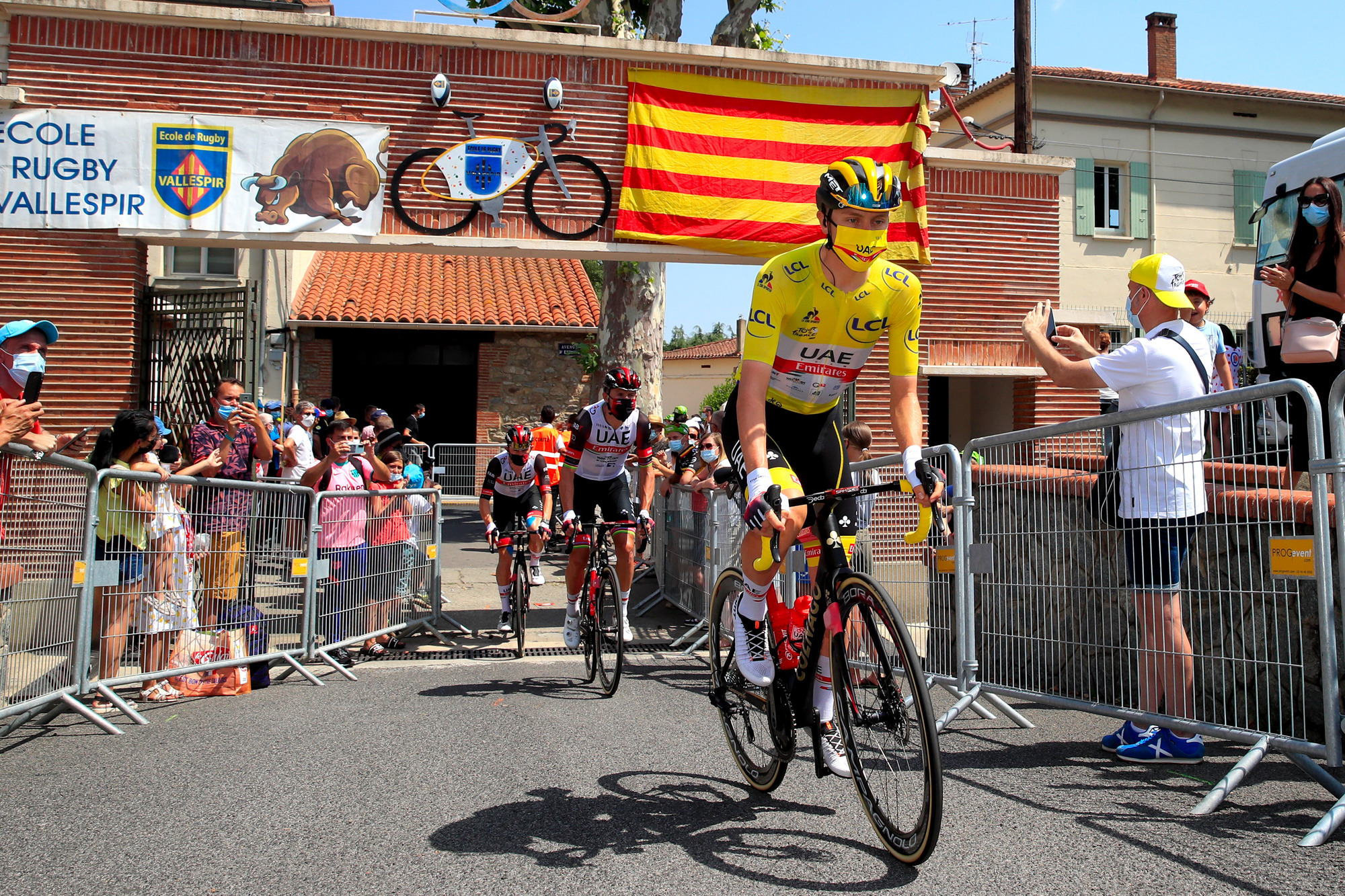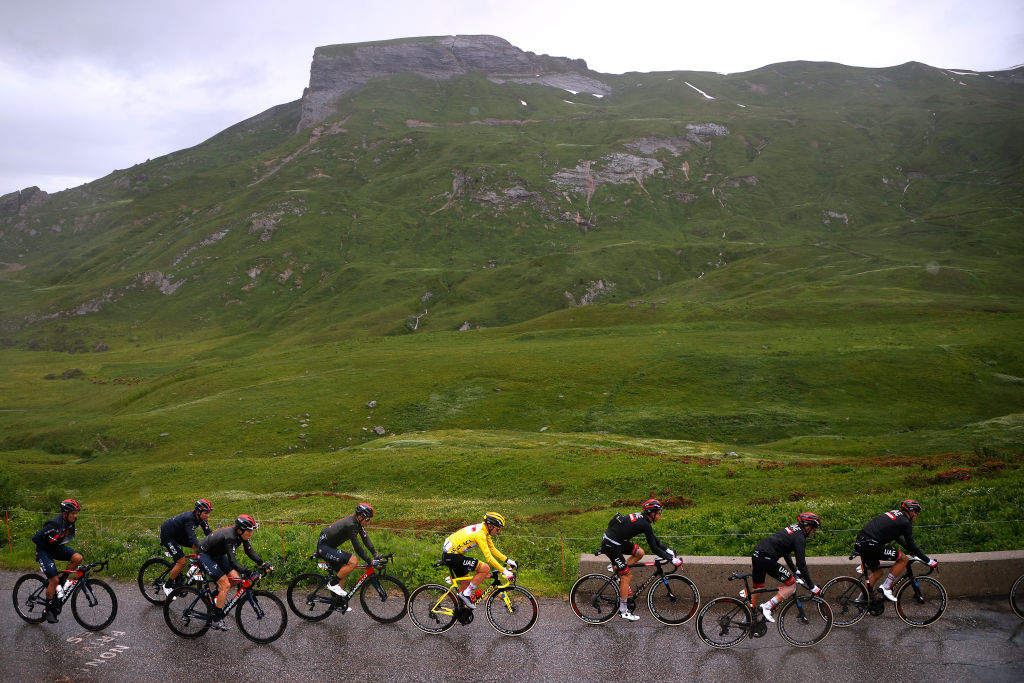UAE Team Head of Medicine defends Tour de France leader Pogacar’s stance on anti-doping controls
Analysing the reasons for the 22 year old's outstanding performances

UAE Team Emirates Head of Medicine Jeroen Swart has defended Tour de France leader Tadej Pogačar’s stance on anti-doping controls after the UAE rider argued that he did enough tests to silence those who doubted his performance.
In a press conference last week, Pogačar discussed how he handled any suspicious questions about his superiority as a racer in the Tour by saying, “I think we have many controls.”
Swart subsequently confirmed his agreement with Pogačar in terms of the number of tests, although he warned that imperfections in the current anti-doping technology available sometimes left riders “trying to prove a negative, and that’s not possible.”
In a lengthy interview with Cyclingnews, Swart also discussed the university research carried out by UAE Team Emirates head coach Iñigo San Millán who investigated physiological reasons for Pogačar’s physical potential, as well as what he claimed are Pogačar’s notable mental qualities as an athlete.
As for the state of anti-doping tests that are currently carried out in the Tour de France and elsewhere, Swart told Cyclingnews, “There are two parts to that: one is whether we do enough controls and the other is whether those controls are effective."
"I definitely think there are enough controls. As Tadej pointed out in that interview he had three controls in one day [the Sunday the race reached Tignes - Ed]. And he’s had very many controls already in this Tour de France.
“Yes, you could potentially increase them .... but that, I think, starts to…specially blood controls, every time they do that, they’re puncturing a vein and it’s not an innocuous procedure.
Get The Leadout Newsletter
The latest race content, interviews, features, reviews and expert buying guides, direct to your inbox!
“So there’s an upper limit to how much is reasonably tolerable when it comes to how many controls are done. And they’re doing a great many at this point in time.“
However, the number of tests is one thing, but the other is the quality, Swart argues.
“We do know that the controls are not universally capable of detecting doping. You cannot prove as an athlete you are absolutely clean [and that] there’s no chance of anything nefarious happening. The technology is simply not there to be able to do that.
“So we end up in this age-old conundrum of the athlete saying, ‘I can only speak for myself and what I’ve done.’
“It’s trying to prove a negative and that’s not possible. What more can be said about that other than what Tadej said in the press conference?”
A reputed sports physician at the University of Cape Town, Swart has worked in cycling for many years, with one of his most high-profile projects in 2015 when he carried out a battery of physiological tests on Chris Froome. He argued that the evidence produced did boost Froome’s claims that he was riding clean.
Swart also did his PhD in exercise science and looking at the mental component of fatigue. Part of that involved developing a rating scale, unique at the time, to measure a psychological sense of effort. Given mental fatigue is known to reduce the capacity for exercise performance, “it’s a constant battle between motivation and the sense of effort,” he said.
Regarding the Tour de France, getting through a rain-soaked trek through the Alps like stage 9 to Tignes, he said, particularly after the fatigue of the previous days, required an amount of mental energy that “is one of the greatest in terms of any sporting events.”
But Pogačar, who dropped the GC favourites for a second day running, was clearly not lacking in mental energy on that stage, on top of that Swart said, “there’s his emotional maturity.”
“One of the key things that struck me when I first met Tadej, is that for someone of his age he’s always shown incredible maturity. He’s got a [high] level of professionalism in his behaviour towards staff, training, and all the other aspects.”
He describes Pogačar as someone "who doesn’t necessarily show the stress of being a leader as much as other people in a similar situation. He’s still jovial. He’s relaxed and professional about it all. That’s something you don’t often see in someone as young as he is and that’s one of the key aspects of his performances."
Swart’s underlining of the importance of the mental aspect of trying to triumph in the Tour de France was echoed last year in the words of another recent young Grand Tour winner, Tao Geoghegan Hart (Ineos Grenadiers): “I learned that a Grand Tour is frigging hard, it's all about your mind,” he told sister publication, ProCycling magazine, a few months after taking the Giro d’Italia.
It’s worth noting that mental endurance is by no means a fixed value. As Swart said, it can be honed via what he calls “its learning component."
“That’s when a sports psychologist will talk about optimum arousal levels. Because under-arousal leads to under-performance, and so does over-arousal. So there's teaching athletes to focus on the controllables and not to spend emotional energy on the uncontrollable elements.”

Mental qualities
Swart said Pogačar possesses exceptional mental qualities, and said elsewhere last year his ability to recover, which is vital for stage racing, was “off the charts”.
Establishing Pogačar’s potential in that area was, Swart said, directly linked to independent research carried out by their head coach, and Pogačar’s personal coach, San Millán.
Currently a professor at the University of Colorado School of Medicine “Iñigo’s very involved in what we call metabolomics, which is the field of identifying and measuring various molecules involved in the various different metabolic processes,” Swart said.
“Physiologists have this vast chart, two metres by one in a small font size, which tries to map out different physiological processes in the body at any given time, with all kinds of arrows connecting how they interact.
“Of those various molecules, be they amino acids or metabolites, there were measurements done in the team. And Tadej’s metabolites are of a much greater concentration than other athletes measured at the same time with the same physiological stress.”
Rather than being kept strictly under wraps, Pogačar’s metabolite values are available for public scrutiny given they form part of research published last year in a scientific journal, Swart points out.
The effect is also plain for the public to see in the Tour de France and other races, and within UAE, Swart said, "we are aware his physiological attributes are very different to the average professional cyclist and one of the key areas is his recovery status.“
“Tadej seems to recover really rapidly from hard efforts, and that has two impacts. It allows an individual to train harder. That’s whether it is two or three days with one day or two days recovery, you can do longer and harder cycles with shorter recovery periods. You can still adapt to that and reach a higher level of performance.”
Secondly as Swart points out, in a stage race, that recovery ability is vital and by the third week of a Grand Tour, it becomes a bigger and bigger component of an athlete’s performance.
One obvious example of where Pogačar was able to shine so well in a Grand Tour third week was at the Planche des Belles Filles last year, and another was in the Vuelta in 2019, when he launched a successful, solo, 35-kilometre breakaway on the last day of the mountains. Swart also cites Greg Lemond in 1989 and winning the Tour in the final time trial.
As Swart puts it, “the Tour can change very quickly in a short space of time in the final week based on that aspect.”
Where it will take Pogačar in this third week of the Tour de France we will all find out, too, over the next six days racing.
Alasdair Fotheringham has been reporting on cycling since 1991. He has covered every Tour de France since 1992 bar one, as well as numerous other bike races of all shapes and sizes, ranging from the Olympic Games in 2008 to the now sadly defunct Subida a Urkiola hill climb in Spain. As well as working for Cyclingnews, he has also written for The Independent, The Guardian, ProCycling, The Express and Reuters.
